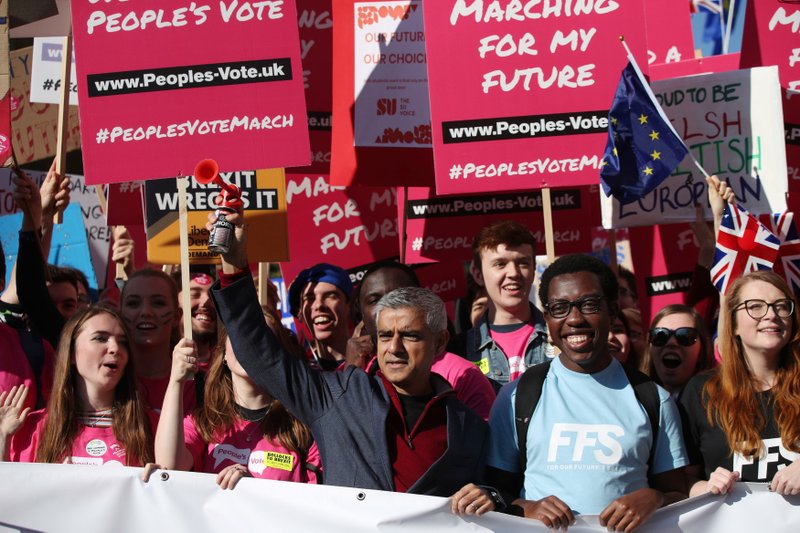LONDON -- Hundreds of thousands of protesters opposed to Britain's impending exit from the European Union marched through central London on Saturday, demanding a new referendum and to have a say on the government's final exit deal with the EU.
Organizers say another public vote is needed because facts have come out about the costs and complexity of Britain's exit from the bloc, which voters chose to leave in a 2016 referendum.
The organizers estimated that about 700,000 people took part Saturday in the "People's Vote March," for which 150 buses of marchers poured into the British capital from across the country. Police did not provide an attendance estimate.
"What's clear is that the only options on the table now from the prime minister are a bad Brexit deal, or no deal whatsoever," London Mayor Sadiq Khan, who joined the march, told the BBC. "That's a million miles away from what was promised 2½ years ago."
Khan said Saturday's protest was a "march for the future" for young Britons, including those who were too young to participate in the 2016 referendum, when those who favored leaving the EU won with 52 percent of the vote.
The mayor, from the opposition Labor Party, has backed mounting calls for a fresh referendum so the public can have a say on whether it accepts Prime Minister Theresa May's exit deal or chooses to stay in the EU.
May, the leader of Britain's Conservatives, has ruled out another vote on the subject.
That didn't stop the crowds on Saturday from demanding one. Among the participants was Lord of the Rings actor Andy Serkis, who marched with his son and wife. Serkis said he believes there should be a second referendum "now that people are more informed."
Participants in the march, including teenagers and the elderly, chanted "Hey, hey, Theresa May, give us all a final say" as they walked along the route through central London. Marchers held up banners suggesting they arrived from all corners of the country, while others were Spanish, French and Italian.
The negotiations so far have been "full of incompetence by the British government," said one protester, Julie Sirvent, 35, a French citizen who works in oil and gas project management and has lived in the U.K. since 2014.
Another protester, Jeremy, who declined to give his full name, said he feared a departure from the EU would turn out to be a "disaster" for Britain.
"We all want what's best for this country, and we are the true patriots," he said. "I just don't see the point. It's almost like losing your biggest trading partner to go and start trading completely on your own."
"You know, you've gone from having a deal with somebody like Tesco to being a corner shop," he said, referring to the Britain-based grocery chain.
Britain is scheduled to leave the EU on March 29, but negotiations over the divorce have been plagued by disagreements, particularly over the future border between the Republic of Ireland and Northern Ireland. It will be the U.K.'s only land border with the EU after the departure, as Ireland is part of the EU and Northern Ireland is part of the U.K.
One of the accomplishments of the 1998 peace deal that ended decades of violence in Northern Ireland was to dismantle the police and military presence at the border with Ireland. Many on both sides do not want a "hard" border again.
There are also growing fears of a "no-deal" British exit, which could create chaos at the borders and in the EU and British economies.
May, speaking at an inconclusive EU summit in Brussels last week, said she would consider extending a proposed 21-month post-exit transition period for the U.K. -- one that could keep Britain aligned with EU rules for more than two years.
The EU has said that extending such a period would give more time to strike a trade deal that ensures the Irish border remains friction-free. Pro-exit politicians in Britain, however, saw it as an attempt to bind the country to the bloc indefinitely.
Information for this article was contributed by Sylvia Hui of The Associated Press and by Anooja Debnath,Tiago Ramos Alfaro, Tim Ross and Ian Wishart of Bloomberg News.
A Section on 10/21/2018
